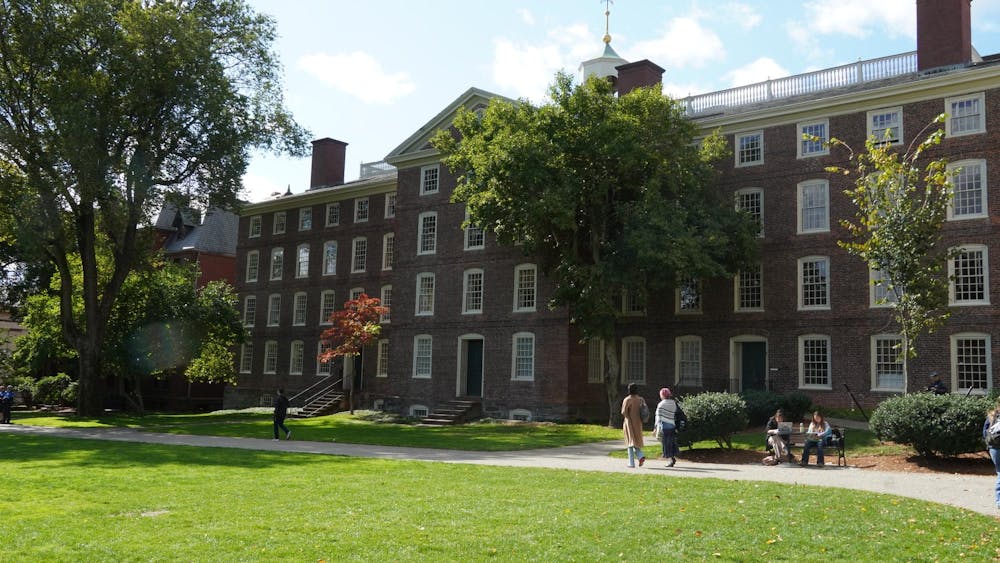Some research and non-tenure track faculty have described their position as a dead-end and feel stagnated. Two new reports from faculty working groups are spotlighting these concerns, from a lack of benefits to difficulties with promotion.
Released in November, the “Status of Research Faculty Report” and the “Report on the Status of Full-Time Non-Tenure Track Teaching Faculty” were created following interviews, surveys and focus-groups with faculty. The groups also analyzed data and compared Brown to peer institutions.
The task forces recommended a number of changes to clarify promotion policy, expand research funding, expand the role of non-tenured faculty in shared governance and improve job security.
Status of Research Faculty Report
The “Status of Research Faculty Report” was initially requested by President Christina Paxson P’19 P’MD’20 and then-Interim Provost Larry Larson last year with the purpose of reviewing Brown research faculty appointments, career development and rights.
Jim Russell, senior associate dean of the faculty and a professor of Earth, environmental and planetary sciences, was chosen to lead the Research Faculty Workstream — the group dedicated to developing recommendations to ensure support and equity for research faculty.
“There are a lot of research faculty at Brown and they do really important things," he said.“They’re not just doing research in labs, they’re leading really important research programs.” Russell added that Brown also has research faculty serving in administrative positions.
More than 250 faculty members are considered research faculty, according to the report. The majority of them are in the School of Public Health and the Division of Biology and Medicine.
Members of workstream spoke to research faculty, with many saying they do not feel valued at Brown, lack clarity surrounding the appointment process and are given limited support and benefits, according to the report.
Ingrid Daubar, an associate research professor of Earth, environmental and planetary sciences, was “unaware of the situation for other research faculty at Brown” before becoming a member of the working group because her department has been uniquely welcoming and supportive.
“I have been invited to faculty meetings, benefitted from mentorship by other professors and included in faculty discussions,” she wrote in an email to The Herald.
“However, some research faculty in other departments have not had the same experience, and unfortunately do not feel as included in their departments,” Daubar added. “One thing I hope comes out of this process is a more uniform experience across the university, where all research faculty feel like a valued part of their communities.”
The group ultimately recommended condensing research faculty positions into two categories: research scientists and research professors. These positions will be dependent on the faculty member’s “level of scholarly independence and leadership in research,” according to the report. They assert that this change will clarify faculty roles both internally and externally.
To support the careers of research faculty, they also recommended creating a clearer structure for research faculty to develop professionally at Brown. This includes providing a clear path of advancement, with explanations of expectations and benefits at each career level, as well as giving assistant, associate and research professors the same level of benefits as provided to tenure-track faculty and staff.
The report also requested providing research faculty with “levels of base funding that will support their engagement with the University and invest in their research programs and careers.”
Individual schools may determine a timeline for the implementation of these recommendations, but requested for implementation, at least in part, beginning July 1, 2025.
“We may not be able to do everything immediately,” Russell said. “We’ll have to work gradually towards implementing as many of the changes as we can and figure out what’s really most important to the research faculty.”
Russell said that he is excited for the progress the working group has made regardless.
“I think it’s really important for faculty at Brown to be happy and to feel supported in the work that they do,” he added. “I think implementing as many of these as we can is a great way to do that for research faculty.”
Report on the Status of Full-Time Non-Tenure Track Teaching Faculty
Last year, the Faculty Executive Committee — the highest body in faculty governance — solicited nominations for faculty members to establish a task force to assess the status of full-time non-tenure track teaching faculty. Their role was to make recommendations regarding these faculty members’ “role and status,” according to the report.
Non-tenure track teaching faculty include three groups: lecturer-track faculty, teaching scholar-track faculty and professors of the practice.
The task force was directed to review the structure and terms for appointments, develop a statement of expectations and benefits and ensure that necessary resources are available for these faculty members. To make their recommendations, members of the task force collected and reviewed data from sources such as administration, focus groups and peer institutions’ data.
James Valles, a tenured professor of physics, works with lecturers often and joined the task force after seeing how hard they work to teach foundational STEM courses and inspire students.
“It’s a very important population for Brown,” he said. “It’s one of the things that makes our undergraduate program strong and attractive.”
Non-tenure track teaching faculty have grown significantly over the past several decades, both at Brown and nationwide, according to the report. Currently, there are 192 faculty with appointments across divisions that are non-tenure track faculty at Brown.
Using the data they collected, the task force found several major issues for non-tenure track teaching faculty.
The first was job security. Because these faculty members do not have tenure, their employment is tied directly to course evaluations, and they face risks when speaking their mind, the report stated.
Valles explained that non-tenure track faculty have less power, “so they do not have as much control or say in what it is that they get to do,” he said.
“They don’t have that same freedom, so what can come with that is occasional frustration,” he added.
The task force went further, adding that “academic freedom seems to be inextricably linked to tenure” in their report.
These faculty members have also cited problems such as being “stuck” in their rank, a lack of clarity surrounding their faculty voting rights and access to information about reappointment and promotion. Other concerns included inequitable course loads and less access to resources and benefits than other faculty members.
Tim Nelson, a member of the task force and a senior lecturer in computer science wrote that he has been aware of colleagues feeling less valued and that he has felt that way himself.
“Brown treats its non-tenure track teaching faculty better than some other institutions do,” he wrote in an email to The Herald. “But there are still very real concerns.”
To resolve these issues, the task force recommended a “considerable investment” in non-tenure track faculty, especially due to the increase in the number of hires in recent years. This would include giving these faculty members the same level of job security and benefits as their tenure-track colleagues.
Additionally, they recommend that departments review their standards and criteria to ensure equity across faculty members and outline a clear promotion path. They also recommended measures such as establishing a university-wide mentorship program for new non-tenure track faculty.
“There’s some significant kind of non-uniformity and lack of definition exactly in what is expected for people in these ranks across different places,” Valles said. “I think they want to do whatever they can to clarify that and make it work for the folks in those ranks, but also work for the departments that they’re in.”
The task force wants all lecturers to have the title “Professor,” have non-tenure track faculty representation on faculty governance committees, such as the Tenure and Promotion Committee and publish salary ranges for each University division to establish transparency.
The report will be reviewed by senior administration and department chairs who will offer feedback to the task force. Faculty members will also have the opportunity to discuss the reports at an upcoming Spring town hall.
“Brown has an opportunity to be a leader on these issues and I hope they will be,” Nelson wrote.

Cate Latimer is a university news editor covering faculty, University Hall and higher education. She is from Portland, OR, and studies English and Urban Studies. In her free time, you can find her playing ultimate frisbee or rewatching episodes of Parks and Rec.





